- Home
- Winston K. Marks
Tabby
Tabby Read online
Produced by Greg Weeks, Mary Meehan and the OnlineDistributed Proofreading Team at https://www.pgdp.net
TABBY
By Winston Marks
Illustrated by Rudolph Palais
[Transcriber Note: This etext was produced from IF Worlds of ScienceFiction March 1954. Extensive research did not uncover any evidence thatthe U.S. copyright on this publication was renewed.]
[Sidenote: _Tabby was peculiar, of course, but seemed harmless: just alittle green fly that couldn't even protect itself from ordinaryspiders. So the spiders fed, and grew, and fed, and grew...._]
* * * * *
April 18, 1956
Dear Ben: It breaks my heart you didn't sign on for this trip. Yourreplacement, who _calls_ himself an ichthyologist, has only one talentthat pertains to fish--he drinks like one. There are nine of us in theexpedition, and every one of us is fed up with this joker, Cleveland,already. We've only been on the island a week, and he's gone native,complete with beard, bare feet and bone laziness. He slops around thelagoon like a beachcomber and hasn't brought in a decent specimen yet.
The island is a bit of paradise, though. Wouldn't be hard to letyourself relax under the palms all day instead of collecting blistersand coral gashes out in the bright sun of the atoll. No complaints,however. We aren't killing ourselves, and our little camp is verycomfortable. The portable lab is working out fine, and the screenedsleeping tent-houses have solved the one big nuisance we've sufferedbefore: _Insects_. I think an entomologist would find more to keep himbusy here than we will.
Your ankle should be useable by the time our next supply plane fromHawaii takes off. If you apply again at the Foundation right now I'msure Sellers and the others will help me get rid of Cleveland, andthere'll be an open berth here.
Got to close now. Our amphib jets off in an hour for the return trip.Hope this note is properly seductive. Come to the isles, boy, andlive!--Cordially, Fred
* * * * *
May 26, 1956
Dear Ben: Now, aren't you sorry you didn't take my advice?!!!! I'massuming you read the papers, and also, that too tight a censorshiphasn't clamped down on this thing yet. Maybe I'm assuming too much onthe latter. Anyhow, here's a detailed version from an actual eyewitness.
That's right! I was right there on the beach when the "saucer" landed.Only it looked more like a king-size pokerchip. About six feet acrossand eight inches thick with a little hemispherical dome dead center ontop. It hit offshore about seventy-five yards with a splash that soundedlike a whale's tail. Jenner and I dropped our seine, waded to shore andstarted running along the beach to get opposite it. Cleveland came outof the shade and helped us launch a small boat.
We got within twenty feet of the thing when it started moving out,slowly, just fast enough to keep ahead of us. I was in the bow lookingright at it when the lid popped open with a sound like a cork coming outof a wine bottle. The little dome had split. Sellers quit rowing and weall hit the bottom of the boat. I peeked over the gunwale right away,and it's a good thing. All that came out of the dome was a little cloudof flies, maybe a hundred or so, and the breeze picked them up and blewthem over us inshore so fast that Cleveland and Sellers never did seethem.
I yelled at them to look, but by then the flies were in mingling withthe local varieties of sudden itch, and they figured I was seeingthings. Cleveland, though, listened with the most interest. It developsthat his specialty _is_ entomology. He took this job because he was outof work. Don't know how he bluffed his way past the Foundation, but herehe is, and it looks like he might be useful after all.
He was all for going ashore, but Sellers and I rowed after the whitedisk for awhile until it became apparent we couldn't catch it. It's agood thing we didn't. A half hour later, Olafsen caught up to it in thepower launch. We were watching from shore. It was about a half mile outwhen Ole cut his speed. Luckily he was alone. We had yelled at him topick us up and take us along, but he was too excited to stop. He passedus up, went out there and boom!
It wasn't exactly an A-bomb, but the spray hit us a half mile away, andthe surface wave swamped us.
Sellers radioed the whole incident to Honolulu right away, and they aresending out a plane with a diver, but we don't think he'll findanything. Things really blew! So far we haven't even found anyidentifiable driftwood from the launch, let alone Ole's body or tracesof the disk.
Meanwhile, Cleveland has come to believe my story, and he's out prowlingaround with an insect net. Most energy he's shown in weeks.
* * * * *
May 28--Looks like this letter will be delayed a bit. We are underquarantine. The government plane came this morning. They sent along adiver, two reporters and a navy officer. The diver went down right away,but it's several hundred feet deep out there and slants off fast. Thisisland is the tip of a sunken mountain, and the diver gave up after lessthan an hour. Personally I think a couple of sharks scared him off, buthe claims there's so much vegetable ruck down there he couldn't expectto find anything smaller than the launch's motor.
Cleveland hasn't found anything unusual in his bug net, but everyone isexcited here, and you can guess why.
When the "saucer" reports stopped cold about a year ago, you'llremember, it made almost as much news for a while as when they werefirst spotted. Now the people out here are speculating that maybe thisdisc thing came from the same source as the _saucers_, after they had achance to look us over, study our ecology and return to their base.Cleveland is the one who started this trend of thought with hisobsession that the flies I reported seeing are an attack on our planetfrom someone out in space.
Commander Clawson, the navy officer, doesn't know what to think. Hewon't believe Cleveland until he produces a specimen of the"fly-from-Mars", but then he turns around and contradicts himself bydeclaring a temporary quarantine until he gets further orders fromHonolulu.
The reporters are damned nuisances. They're turning out reams of Sundaysupplement type stuff and pestering the devil out of Sparks to let themwire it back, but our radio is now under navy control, too.
Sure is crowded in the bunk-house with the six additional people, but noone will sleep outside the screen.
* * * * *
May 29--Cleveland thinks he has his specimen. He went out at dawn thismorning and came in before breakfast. He's quit drinking but he hasn'tslept in three days now and looks like hell. I thought he was gettinghis fancy imagination out of the bottle, but the soberer he got the moreworried he looked over this "invasion" idea of his.
Now he claims that his catch is definitely a sample of something newunder our particular sun. He hustled it under a glass and startedclassifying it. It filled the bill for the arthropods, class Insecta. Itlooked to me, in fact, just like a small, ordinary blowfly, except thatit has green wings. And I mean _green_, not just a little iridescentcolor.
Cleve very gently pulled one wing off and we looked at it under lowpower. There is more similarity to a leaf than to a wing. In the bug'sback is a tiny pocket, a sort of reservoir of the green stuff, andCleve's dissection shows tiny veins running up into the wings. It seemsto be a closed system with no connection with the rest of the bodyexcept the restraining membrane.
Cleveland now rests his extraterrestrial origin theory on an idea thatthe green stuff is chlorophyll. If it is chlorophyll, either Cleve isright or else he's discovered a new class of arthropods. In otherrespects the critter is an ordinary biting and sucking bug with thepotentials of about a deerfly for making life miserable. The high-powerlens showed no sign of unusual or malignant microscopic life in
side orout of the thing. Cleve can't say how bad a bite would be, because hedoesn't have his entomologist kit with him, and he can't analyze thesecretion from the poison gland.
The commander has let him radio for a botanist and some micro-analysisequipment.
Everyone was so pitched up that Cleve's findings have been ratheranti-climactic. I guess we were giving more credence to thespace-invader theory than we thought. But even if Cleve has proved it,this fly doesn't look like much to be frightened over. The reporters areclamoring to be let loose, but the quarantine still holds.
* * * * *
June 1--By the time the plane with the botanist arrived we were able togather all the specimens of _Tabanidae viridis_ (Cleveland'sdesignation) that he wanted. Seems like every tenth flying creature youmeet is a green "Tabby" now.
The botanist helped Cleve and me set up the bio kit, and he confirmedCleve's guess. The green stuff is chlorophyll. Which makes Tabby quite abug.
Kyser, the youngest reporter, volunteered to let a Tabby bite him. Itdid without too much coaxing. Now he has a little, itchy bump on hiswrist, and he's happily banging away at his typewriter on a storytitled, "I Was Bitten by the Bug from Space!" That was hours ago, and wehaven't learned anything sinister about the green fly except that itdoes have a remarkable breeding ability.
One thing the reporter accomplished: we can go outside the screenedquarters now without wondering about catching space-typhus.
* * * * *
June 2--The quarantine was probably a pretty good idea. Cleve has turnedup some dope on Tabby's life cycle that makes us glad all over that weare surrounded by a thousand miles of salt water. Tabby's adult life isonly a couple of days, but she is viviparous, prolific (some thousandyoung at a sitting), and her green little microscopic babies combine thebest survival features of spores and plankton, minus one: they don'tlive in salt water. But they do very well almost anyplace else. We havewatched them grow on hot rocks, leaves, in the sand and best of all,filtered down a little into the moist earth.
They grow incredibly fast with a little sun, so the chlorophyll isbiologically justified in the life-cycle. This puzzled us at first,because the adult Tabby turns into a blood-sucking little brute.Deprived of any organic matter, our bottled specimens die in a shorttime, in or out of the sunlight, indicating the green stuff doesn'tprovide them with much if any nourishment after they are full-grown.
Now we are waiting for a supply of assorted insecticides to find thebest controls over the pests. The few things we had on hand worked quitewell, but I guess they aren't forgetting our sad experience with DDT afew years back.
The Tabbies now outnumber all the other insects here, and most outsidework has been halted. The little green devils make life miserableoutside the tent-houses. We have built another screened shelter toaccommodate the latest arrivals. We are getting quite a fleet ofamphibian aircraft floating around our lagoon. No one will be allowed toreturn until we come up with all the answers to the question ofcontrolling our insect invasion.
Cleveland is trying to convince Sellers and the commander that we shouldget out and send in atomic fire to blow the whole island into the sea.They forwarded his suggestion to the U. N. committee which now hasjurisdiction, but they wired back that if the insect is from space, wecouldn't stop other discs from landing on the mainlands. Our orders areto study the bug and learn all we can.
Opinion is mixed here. I can't explain the flying disc unless it'sextraterrestrial, but why would an invader choose an isolated spot likethis to attack? Cleve says this is just a "test patch" and probablyunder surveillance. But why such an innocuous little fly if they meanbusiness?
The newsmen are really bored now. They see no doom in the bugs, andsince they can't file their stories they take a dim view of thequarantine. They have gotten up an evening fishing derby with the crewmembers of the planes. Have to fish after dusk. The Tabbies bite toooften as long as the sun is up.
Cleve has turned into a different man. He is soft-spoken and intense.His hands tremble so much that he is conducting most of his work byverbal directions with the botanist and me to carry them out. When hissuggestion about blowing up the atoll was turned down he quit talkingexcept to conduct his work. If things were half as ominous as he makesout we'd be pretty worried.
* * * * *
June 4--The spray planes got here and none too soon. We were running outof drinking water. The Tabbies got so thick that even at night a manwould get stung insane if he went outside the screen.
The various sprays all worked well. This evening the air is relativelyclear. Incidentally, the birds have been having a feast. Now the gullsare congregating to help us out like they did the Mormons in the cricketplague. The spiders are doing all right for themselves, too. In fact,now that we have sprayed the place the spiders and their confounded websare the biggest nuisance we have to contend with. They are getting fatand sassy. Spin their webs between your legs if you stand still a minutetoo long. Remind me of real estate speculators in a land boom, thelittle bastardly opportunists. As you might gather, I don't care forbrothers Arachnidae. They make everyone else nervous, too. Strangely,Cleveland, the entomologist, gets the worst jolt out of them. He'llstand for minutes at the screen watching them spin their nasty webs andskipping out to de-juice a stray Tabby that the spray missed. And he'llmutter to himself and scowl and curse them. It is hard to include themas God's creatures.
Cleve still isn't giving out with the opinions. He works incessantly andhas filled two notebooks full of data. Looks to me like our work isalmost done.
* * * * *
August 7, Year of our Lord 1956--To whom it will never concern: I can nolonger make believe this is addressed to my friend, Ben Tobin. Clevelandhas convinced me of the implications of our tragedy here. But somehow itgives me some crazy, necessary ray of hope to keep this journal untilthe end.
I think the real horror of this thing started to penetrate to me aboutJune 6. Our big spray job lasted less than 24 hours, and on that morningI was watching for the planes to come in for a second try at it when Inoticed the heavy spider webbing in the upper tree foliage. As I lookeda gull dove through the trees, mouth open, eating Tabbies. Damned if thewebs didn't foul his wings. At first he tore at them bravely and itlooked like he was trying to swim in thin mud--sort of slow motion. Thenhe headed into a thick patch, slewed around at right angles and did acomplete flip. Instantly three mammoth spiders the size of my fistpounced out on him and trussed him up before he could tear loose withhis feet.
His pitiful squawking was what made me feel that horror for the firsttime. And the scene was repeated more and more often. The planes dustedus with everything they had, and it cut down the Tabbies pretty wellagain, but it didn't touch the spiders, of course.
And then our return radio messages started getting very vague. We weretransmitting Cleve's data hourly as he compiled it, and we had beengetting ordinary chatter and speculation from the Honolulu operator atthe end of our message. That stopped on the sixth of June. Since then,we've had only curt acknowledgements of our data and sign-offs.
At the same time, we noticed that complete censorship on news of oursituation and progress apparently hit all the long-wave radiobroadcasts. Up to that time the newscasts had been feeding out a diluteand very cautious pablum about our fight against Tabby. Immediately whenwe noticed this news blind spot Cleve went all to pieces and starteddrinking again.
Cleve, Sellers and I had the lab tent to ourselves, having moved ourbunks in there, so we got a little out of touch with the others. Itwasn't the way Sellers and I liked it, but none of us liked the tripfrom lab to living quarters any more, although it was only fifty feet orso.
Then Sparks moved in, too. For the same reason. He said it was gettingon his nerves running back and forth to the lab to pick up our outgoingbulletins. So he shifted the generator, radio gear and all over to acorner of the lab and brought in hi
s bunk.
By the tenth of June we could see that the spraying was a losing battle.And it finally took the big tragedy to drive home the truth that was allabout us already. When the crew got ready to go out to their planes onthe eleventh, everyone except the four of us in the lab tent was draftedto help clear webs between the tents and the beach. We could hear themshouting from tent to tent as they made up their work party. We could nolonger see across the distance. Everywhere outside, vision was obscuredby the grayish film of webs on which little droplets caught the tropicalsun like a million tiny mirrors. In the shade it was like trying to peerthrough thin milk, with the vicious, leggy little shadows skitteringabout restlessly.
As usual in the morning, the hum of the Tabbies had risen above thenormal jungle buzzing, and this morning it was the loudest we'd heardit.
Well, we heard the first screen door squeak open, and someone let out awhoop as the group moved out with brooms, palm fronds and sticks tosnatch a path through the nightmare of spider webs. The other two doorsopened and slammed, and we could hear many sounds of deep disgust voicedamid the grunts and thrashings.
They must have been almost to the beach when the first scream reachedus. Cleve had been listening in fascination, and the awful sound torehim loose of his senses. He screamed back. The rest of us had to sit onhim to quiet him. Then the others outside all began screaming--notwords, just shattering screams of pure terror, mixed with roars of painand anger. Soon there was no more anger. Just horror. And in a fewminutes they died away.
* * * * *
Sellers and Sparks and I looked at each other. Cleve had vomited andpassed out. Sparks got out Cleve's whiskey, and we spilled half of ittrying to get drinks into us.
Sparks snapped

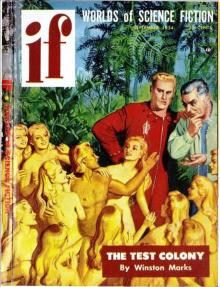 The Test Colony
The Test Colony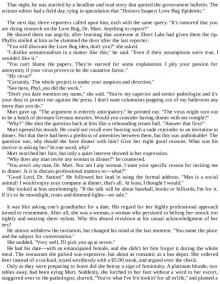 Mate in Two Moves
Mate in Two Moves Brown John's Body
Brown John's Body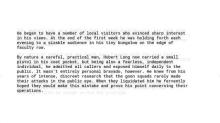 The Deadly Daughters
The Deadly Daughters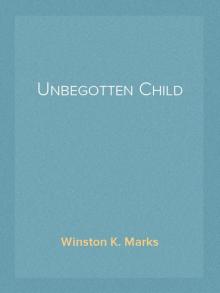 Unbegotten Child
Unbegotten Child The Mind Digger
The Mind Digger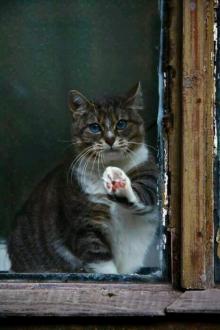 Tabby
Tabby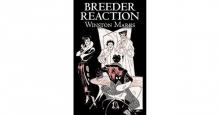 Breeder Reaction
Breeder Reaction